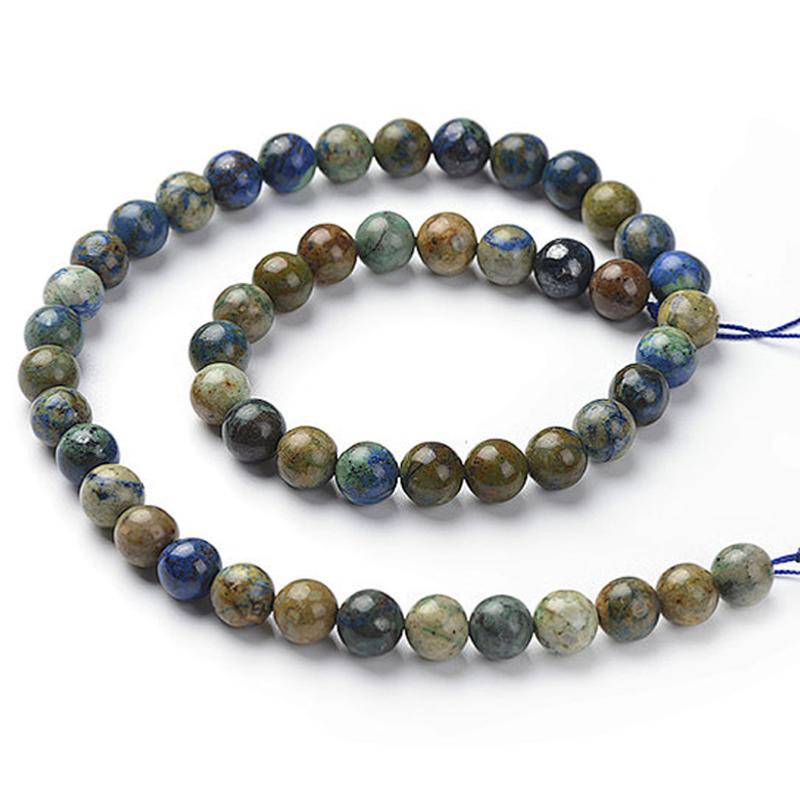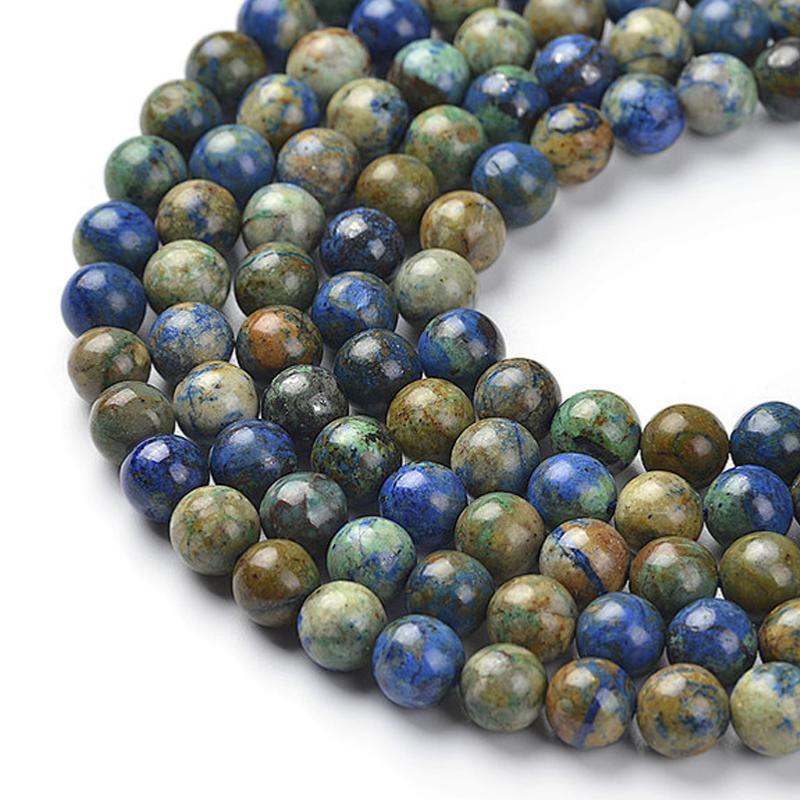Azurite malachite thread Peru AA
FIL-AZUM-015-6mm
- Regular price
-
21,90€ - Regular price
-
- Sale price
-
21,90€
Couldn't load pickup availability
Learn more
Origin: Peru
Grade: AA
- 5-6mm or 7-8mm balls
- Grade = AA (very high)
- About 40cm
- 7-8mm: approximately 48 beads per strand
- Hole size: 0.8/1mm
Azurite malachite is a stone that is very fragile. It must be protected so as not to be damaged. It must be protected from light, sun and temperature variations. Be careful, because there are many azurite malachite stones that are in fact synthetic stones, but sold as natural stones.
It should be noted that azurite and malachite have the same chemical composition and the same crystal system. In azurite malachite, we notice that over time azurite has the ability to transform into malachite, this is the phenomenon of pseudomorphosis. In this association, azurite and malachite are united in syngenesis, that is to say that they were formed at the same time within the same aggregate thanks to a phenomenon of copper oxidation.
Known since the 17th century BC, azurite has been used in many civilizations. Traces have been identified in ointments made by Egyptians of the 4th dynasty. This stone was known to combat pain. Azurite also had another function, which was to serve as a blue pigment in frescoes or in the decoration of art objects.
At the same time, the Greeks called this stone "kuanos” (cyan). For them, it represented a stone with powerful healing powers. As for the Romans, they called it "caeruleum”. It is also a pigment used in decorations or artistic paintings. The Greeks and Romans had found deposits of this stone in Armenia or on the island of Cyprus.
In the Mayan civilization, the blue stone had a sacred power: it evoked the wisdom of a great purity of the heart.
In 317 BC, the alchemist, philosopher and botanist Theophrastus described azurite in his work The Treatise on Stones and gave it the name Lapis Armenis or Armenian Stone.
In the Middle Ages, blue stone came from Germany or Hungary. It was used to color manuscripts. Then discovered in Chessy-les-Mines in the Rhône, it was also called chessylite.
In 1824, the mineralogist and geologist François Sulpice Beudant gave it the name azurite, in reference to its azure blue color.
The name Malchite comes from the Latin term "malachite" which means through. This term comes from a plant called "Malache". The leaves of this plant have an intense green color.
Truly adored by the Egyptians, malachite is the symbol of eternal youth and rebirth. When the Egyptians spoke of life after death, they spoke of the domain of Malachite. They firmly believed in resurrection and a new life after death, represented by malachite. During their pregnancy, Egyptian women wore a malachite around their neck and honored Thoueris, the protective goddess of motherhood, with this stone as an offering.
In Greece, fighters wore malachite amulets to protect them from possible injuries. This green stone was known to help them heal more quickly. This stone is found as a decoration in the temple of Artemis, goddess of the hunt in Ephesus.
In the Middle Ages, this stone was said to have virtues that allowed one to understand animals. It was also used as a lucky charm and it was thought that this stone protected children from fatal diseases.
But this stone is often used as an ornamental stone and to this day, we discover it in many illuminations or frescoes.
Azurite malachite is a mixture of blue azurite and green malachite. It is particularly appreciated for this unusual appearance with this mixture of intense blue and shimmering green. Nowadays, this stone is used in the manufacture of jewelry and in the practice of lithotherapy. Indeed, it is particularly beneficial because it combines the benefits of both stones.
Deposits of Azurite Malachite stone are found in Peru, Congo, Bolivia, China, Mexico and Morocco.
In Lithotherapy, azurite malachite combines the benefits of both stones and is therefore particularly appreciated for its many qualities.
Azurite is a particularly effective stone for people suffering from stress, anguish and anxiety. It allows the mind and psyche to rest by providing calm.
It promotes introspection, allows us to understand certain blockages due to past events and therefore to overcome them. It is a stone turned towards the future which encourages family and professional projects.
This stone provides spiritual elevation and cultivates intuitions, makes one see what is beyond appearances. It facilitates meditation and concentration.
It develops wisdom and provides harmony of life.
Malachite strengthens self-confidence and removes negative feelings. It keeps its wearer away from tensions and states of intense sadness.
It also reduces anxiety and anguish. Thus, it eliminates nightmares and provides restful and quality sleep.
This stone also develops wisdom and allows a better understanding of others. It generates a great quality of listening.
Placed on the throat, it frees speech and provides positive communication. It gives the possibility of structuring and clarifying thoughts.
Features
Color :
- Blue
Astrological sign:
Stone Type:
- Ball Stones
Age :
- Adults
Gender :
- Unisex



Azurite malachite thread Peru AA
- Regular price
-
21,90€ - Regular price
-
- Sale price
-
21,90€
Basé sur 4 avis soumis à un contrôle
- Pour plus d’informations sur les caractéristiques du contrôle des avis, la possibilité de contacter l’auteur de l’avis, les délais de publication et de conservation des avis, ainsi que les modalités de suppression ou modification des avis, merci de consulter nos CGU.
- Aucune contrepartie n’a été fournie en échange des avis, à l’exception des avis indiqués avec la mention "Récompensé et vérifié" et dont les modalités de contrôles sont disponibles ici.
- Les prénoms affichés avec un * ont été pseudonymisés à la demande de l'auteur.
-
3
-
1
-
0
-
0
-
0
Trier les avis
-
5/5VérifiéCollecté et vérifié par Avis Vérifiés
Perles de qualité
Cet avis vous a été utile ? Oui (0) Non(0)SignalerAvis du , suite à une expérience du par Véronique J.
Afficher les commentairesMasquer les commentaires -
5/5VérifiéCollecté et vérifié par Avis Vérifiés
Magnifiques pierres !!!
Cet avis vous a été utile ? Oui (0) Non(0)SignalerAvis du , suite à une expérience du par Virginie L. V.
Afficher les commentairesMasquer les commentaires -
4/5VérifiéCollecté et vérifié par Avis Vérifiés
Conforme.
Cet avis vous a été utile ? Oui (0) Non(0)SignalerAvis du , suite à une expérience du par Daniele w. D.
Afficher les commentairesMasquer les commentaires -
5/5VérifiéCollecté et vérifié par Avis Vérifiés
Très belle qualité.
Cet avis vous a été utile ? Oui (0) Non(0)SignalerAvis du , suite à une expérience du par AUDREY C. A.
Afficher les commentairesMasquer les commentaires
- 1
-
100% SECURE PAYMENT
Paypal, credit card, check, transfer
-
FREE DELIVERY
from 40€ purchase
-
SATISFIED OR REFUNDED
14 days to change your mind
-
CUSTOMER SERVICE AVAILABLE
contact@laboiteacailloux.com
to receive all our offers, good deals and new products from La Boite à Cailloux




